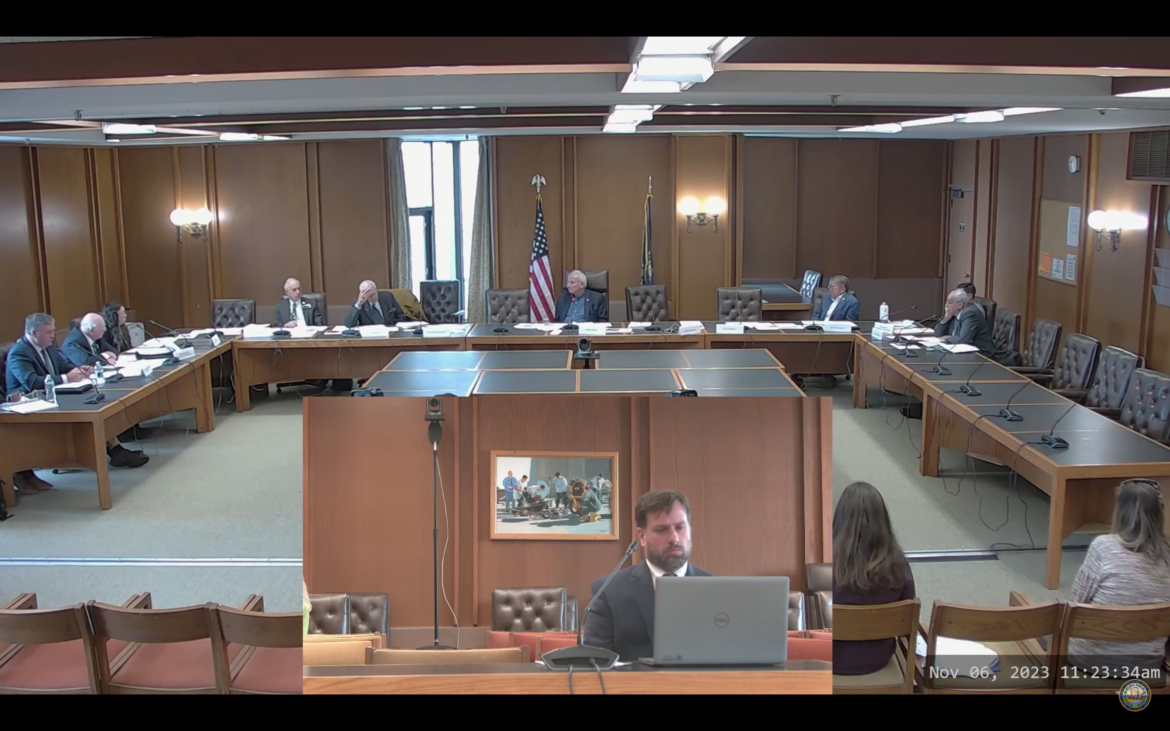By GARRY RAYNO, InDepthNH.org
CONCORD — As a commission studies the charitable gaming industry in light of recent statutory changes, lawmakers are considering outlawing one controversial facet.
Charging charities room rent for the up to 10 days a year they can partner with a gaming operator has no consistency, said the chair of the Commission to Study the Effect of Recent Changes Made to Charitable Gaming Laws, former Rep. Pat Abrami, R-Stratham.
He noted the rent was allowed when the facilities were small and bets were limited to $2 or $3, but since then facilities have expanded to 14 statewide and become much larger and some have added electronic games of historic horse racing.
Abrami said the law states charities shall receive no less than 35 percent of the gross revenues from any games of chance minus any prizes paid and rental charge that is no more than the market rate.
And he said the law also says there has to be an agreement with the facility and at a fixed rate, not a percentage of what the organization receives.
“That’s where I get nervous.” Abrami said, noting he was told by a charity official his organization has no agreement and no set rate.
He said this was all before historic horse racing was added to charity gaming, and those machines are taking greater and greater floor space from the table games.
But Lottery Commission officials, who regulate charity gaming, said all charities have to have a written rental agreement with a gaming facility at a fixed rate, and within the going market rate for a similar sized facility, or it is rejected, said John Conforti, Lottery Commission chief compliance officer.
Conforti said the charities are free to negotiate the rent amount, but it has to be no more than the going local rate.
But another member of the commission noted the charities are at a disadvantage, saying operators will get their asking price or tell the charities they will find another organization that will meet their rent rate.
Lottery Commission Executive Director Charles McIntyre gave the commission a list of facilities, the charities that use each facility and the rents they are charged.
Abrami said he worked on the information over the weekend and determined how much of charities’ receipts were going to rental charges, noting it was from as little as five percent to a high of 50 percent at the Concord Casino.
“I always thought it was a flat number everybody paid to the individual facility,” he said, but that is not the case and he wondered if that was fair to the charities.
He said he thought the smaller facilities would have to charge a greater percentage because of their size, but the smallest facility has the lowest per day rent at $147.
He said the middle-sized facilities charge around $475 a day, and some with historic horse racing are charging two charities a day.
He said one facility was charging $250 a day until historic horse racing was introduced and the price went to $750 a day.
“There is no consistency here at all,” Abrami said, “that is one of the reasons we need to spend some more time on this,” noting the Legislature will act on a bill to eliminate facility rent in January.
Commission member Rep. Fred Doucette, R-Salem, said he has an amendment to a bill before House Ways and Means that will be decided later this week to do away with rental fees.
He said he also filed a bill request for the 2024 session to do the same thing in case the other bill does not go forward.
But commission member Sen. Timothy Lang, R-Sanbornton, said it is “location, location, location.”
The cost in Nashua is going to be greater than it is in Belmont, he said, noting he was not sure how you “normalize data to fair market estimates.”
Abrami said it looks like the rent charges are happening by themselves without many guidelines, noting the lowest percentage of the receipts going to a particular charity does not mean it is paying the lowest rate.
“Do we really need rent is the bigger question,” he said.
McIntyre said the rent was needed when the small facilities were struggling, “but it does not seem like rent is needed anymore.”
Abrami said historically the smaller facilities were protected in order to survive and maybe there is a reason for that and some may continue to need protection, but the larger facilities are making profits and don’t need the rent money to survive.
Commission member Aaron Gomes, Chief Operating Officer of Peninsula Pacific Entertainment, which owns four gaming facilities in the state, said his company both owns and rents facilities.
He said the one they lease, the rent collected from the charities is less than what they pay for the space. That is about as close as you can get, he said.
Abrami noted the facilities range from providing $106,000 to charities a year to $3.7 million and they need to discuss the issue more.
The commission also discussed information provided by the Lottery Commission on gross revenues and how they are distributed among the prize winners, the owners and for what it is used for, the charities and the state.
About 90 percent of money goes into prizes, according to the information.
The commission decided to form a subcommittee to determine what the members want a consultant to do to help with the commission’s work.
The commission will meet again Dec. 4.
Garry Rayno may be reached at garry.rayno@yahoo.com.





